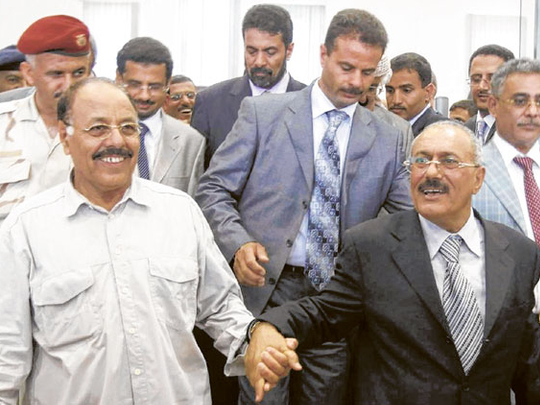
Sana’a: Yemeni President Ali Abdullah Saleh on Wednesday accepted a five-point opposition plan for him to step down by the end of this year.
He had earlier rejected the same plan when it was offered to him at the beginning of this month. However, on Tuesday, two tribal leaders, Sadeq Al Ahmar, and Ahmad Abu Huriah mediated between Saleh and the militant-led opposition coalition, which includes the Islamists, Socialists and Nasserites.
The two tribal leaders are also mediating between the rival military commanders Major General Ali Mohsen, and Ahmad Ali, son of the president, to prevent any bloody conflict between their forces.
A presidential statement late on Wednesday said President Saleh responded to the two mediators, both of them from his tribe, Hashed, and accepted the five-point plan for the sake of peace in Yemen.
According to the presidential statement, the opposition plan will is as follows: A national government will be formed based on a compromise formula, as well as a committee for formulating a new constitution.
Elections will be held on the basis of a proportional representation system.
A new committee will be formed for the conduct of elections.
A referendum should be held on the constitution followed by parliamentary elections and the forming of a new elected government, which in turn should be followed by presidential elections.
All these steps should be taken before the end of this year.
As a pre-condition for implementing this plan, sources close to the mediators said the opposition have demanded that Saleh remove his sons and nephews from their posts and himself leave power within a month.
Meanwhile on the streets, the common protesters seem not to care about such initiatives and plans going on behind the scenes. On Wednesday thousands of them were celebrating the “end of their revolution” in what they called the Square of Change at the gate of Sana’a University, where they have been sitting in for more than a month.
Along with big pictures of the defected military general Ali Mohsin on makeshift podiums, the protesters unfurled a banner which read: “The people have toppled the regime, that’s it.”
A lot of them considered it a victory and the end of their revolution when Mohsin declared his support for them on Monday.
However, not all protesters are happy with the turn of events. Some said the sit-in must continue until Saleh’s entire regime, including Mohsin went out, while others say the “end of the end” will be on Friday when they march to the Presidential Palace to force Saleh to leave, under the protection of their “supporter” Major General Mohsin.
Again, there are division between the protesters regarding the march to the palace. A young protester, Kamal Sharaf, said: “I refuse (to participate in) the march. If the opposition wants to march let them do it.”
Another protester, Wadha Abdul Jaleel, said: “Why bother marching, the regime is collapsing. We should simply wait until it’s collapsed.”
Tawakul Karman, a leading female member of the Islamists and one of the leaders of the anti-Saleh protests from its beginning in February, said: “We must march forward on Friday. Mohammad Qahtan declared Friday was for marching forward, and he is the spokesman of the opposition who are our biggest partners. We must follow what they say.”
Karman is in Islah, the same Islamist party as Qahtan, who on Tuesday called on the protesters to march to the “bed room of Saleh” with open chests “to let Saleh kill whoever he likes from the protesters”.
Commenting on Saleh’s acceptiance of the five-point plan on Wednesday, Qahtan said: “The people have discarded the regime of Saleh. What’s left now is the march on Friday to the Presidential Palace.”
While the people and protesters, and even the officials themselves, interpret the declared support of Major General Ali Mohsin in different ways, Mohsin sent an envoy to the protesters’ camp with a clarification statement on Tuesday.
The envoy, Askar Zuail, addressing protesters from the podium in the Square of Change, said: “The era now is the era of peaceful struggle and not the era of coups. We will protect you and your peaceful revolution, and we will protect the accomplishments of the nation. We will be with you until the peaceful transfer of power happens.”












